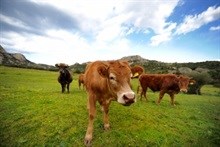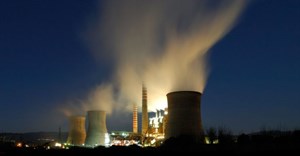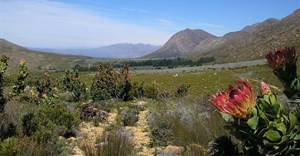
Reducing meat production to reduce greenhouse gasses

Fry was part of a panel discussion entitled 'The Food Revolution - The Right Way to Eat with Jamie Oliver' at the four-day summit, which was attended by more than 2000 delegates aged between 19 and 30 from 191 different countries.
Fry said at the summit that people should stop focusing on carbon dioxide pollution from transport and industry as the main cause of climate change. "The effects of carbon dioxide last for thousands of years in the sky and, even if this were eradicated today, it would still endure for this length of time. A bigger problem that is faster to solve is the 51% of greenhouse gases - mostly methane and nitrous oxide - that are produced by livestock.
"These young delegates were well educated, flexible and open to change. They were receptive to the idea that if people on the planet stopped eating animals, then biodiversity would return and we would have enough food for people without resorting to genetically modified crops.
Methane reduction in four years
"There is so much powerful evidence to encourage people to eat less meat and yet it is almost like asking people to stop breathing air. We still have this disproportionate use of the planet in order to feed animals so people can eat meat."
A 2009 report for the World Watch Institute by former World Bank environmental specialists, Jeff Anhang and Robert Goodland, concluded that livestock accounts for 51% of all greenhouse gases. Previous research by the United Nation's Food and Agricultural Organisation found livestock's contribution to be only 18%.
"In terms of global warming and ozone destruction, methane gas is 20 times more powerful than carbon dioxide because of its increased capacity to trap heat in the atmosphere. With nitrous oxide, the effect is 256 times more potent," Fry continued.
"The good news is that methane dissipates in four years and is organically reabsorbed, reducing global warming. So, hypothetically, if we could miraculously stop all people eating meat, in four years the effects would have passed.
"Obviously this is not going to happen overnight but the ability to reduce global warming dramatically is in our hands. Choosing not to eat meat today - or at least reducing our meat intake - will result in positive effects in our lifetime."
Deforestation
He said that another issue affecting climate change is that livestock production is responsible for 90% of the Amazon deforestation since 1970.
"Huge tracts of oxygen-producing vegetation are being burned, the soot from the rain forest blows to the Antarctic and lands on the snow. Brown snow absorbs heats more quickly than white snow and melts faster.
"Roughly one third (35%) becomes livestock feed for cattle, sheep, pigs, chickens and geese and we should not forget that while we debate, people are dying of hunger every day."
His fellow panel members were Jamie Oliver (via live stream) and UK businessmen Elio Sceti, CEO of Birds Eye Foods and Paul Lindsay, founder and CEO of Ella's Kitchen, all champions of a healthier way of eating.
"Jamie highlighted his work, which is well known, and then each panel member gave a different perspective on food and its effect on people," Fry continued. "In my case it was the environment and climate change and what Fry's Family and the Fry Foundation are doing worldwide to make a difference."
Meat Free Mondays
The company's objective is to get people to eat less meat. The company's Meat Free Mondays campaign has reached over 10,000 school going children in South Africa to date and is gaining momentum.
"During 2013 and 2014, we will aim to visit another 15,000 school learners where we will speak about the environment and explain that the biggest single cause of environmental destruction on the planet is livestock and factory farming.
"We tell this story in a fun way and hopefully give youngsters a better understanding of the effects of eating meat. Ideally, they will go home and encourage their families to have a meat free Monday."
The company has also set up Fry's Foundation to educate people about global warming and meat free living and Fry regularly accepts speaking engagements - including an address to the British Parliament last year.
Fry was impressed with what the One Young World summit was aiming to achieve and attended every session he could. He was fascinated by the calibre of people who gave their time freely to attend the event, Kofi Annan, Richard Branson, Boris Becker, Bob Geldorf and Francois Pienaar and enthralled by the range of issues tackled in the different sessions.
"These are clever, energetic young people who want to right what is wrong with the world," he concludes.

















